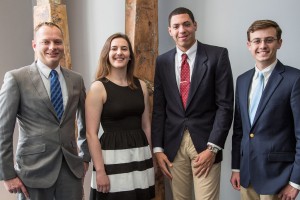Centenary students to present at Economic Scholars Program conference in Dallas

March 22, 2017
SHREVEPORT, LA — Four Centenary economics students will present research findings at the annual Economic Scholars Program (ESP) Conference at the Federal Reserve Bank of Dallas to be held March 30 and 31. Since 2007, student scholars and faculty from institutions across the U.S. and Canada have come together to share undergraduate student-initiated or student/faculty coauthored works at the ESP program sponsored by the Federal Reserve Bank of Dallas in cooperation with Austin College.
“The ESP is such an affirming experience for our Centenary students,” says Dr. Harold Christensen, professor of economics. “Coming from a small, selective school, it is often difficult for them to see how they compare to economics majors at other institutions. The ESP provides an opportunity to observe and share work with some of the very best students in our discipline.”
The ESP conference is the nation’s most prestigious undergraduate research conference in economics, drawing participants from around 45 schools in more than 20 states. Students presenting papers at and attending the conference often have the opportunity to interact with faculty from PhD programs as well as staff from the Federal Reserve Bank. Centenary has had a number of students contacted as a result of their work at ESP, including 2015 alumna Gemma Zuniga who was recently selected for a summer job in the legal department of the Federal Reserve Bank of Dallas. Zuniga is currently attending law school at Baylor University in Waco, Texas.
Christensen reports that Centenary has been represented at each year’s conference since 2008. All junior and senior economics majors are encouraged to attend and all senior majors are required to submit their research for consideration. This year, all four graduating seniors had their research proposals selected, three for presentation and one as a poster. Students began their research during the fall in Dr. Elizabeth Rankin’s required Econometrics class and polished their topics in the Economics Research Seminar team-taught by Drs. Rankin, Christensen, and David Hoaas.
Joshua Carpenter did research in agricultural economics with the cooperation of Dr. Naveen Adusumilli of the Louisiana State University Agricultural Research Station. Carpenter’s paper, “Louisiana Land Allocation: An Econometric Study” examined acreage allotments among corn, cotton, and soybeans by Louisiana farmers. The main objective of Carpenter’s study is to understand how farmers respond to expected price changes in competing crops.
Kendall Demouchet’s paper, “An Analysis of Graduation Rates at 4 Year Colleges and Universities,” focused on factors that help explain graduation success of the first year classes in fall 2008 at both public and private degree-granting institutions in twelve southern states. In
addition to having his paper accepted at the ESP conference, Demouchet served as an ESP discussant in 2016 and on the Peer-Review Board this year.
Luke Groninger’s paper, “Foreign Aid in Afghanistan,” examines the effect of various aid programs on the country’s Gross Domestic Product from 1970 through 2014. Groninger’s motivation for this study arose from the two tours of duty he served in Afghanistan and his first-hand observations about aid policies.
Taylor LeMoal did research on affirmative consent policies. Her paper, “’Yes Means Yes’ or ‘No Means No’: the Effect of Affirmative Consent Policies on Reported Rapes on Campuses,” examines the emerging set of policies surrounding campus rapes and sexual assaults. LeMoal developed a data set of 77 institutions accredited by the Southern Association of Colleges and Schools Commission on Colleges. The dependent variable was the per capita number of incidents reported, the independent variables, in addition to the existence of an affirmative consent policy, included a wide range of institutional characteristics.
